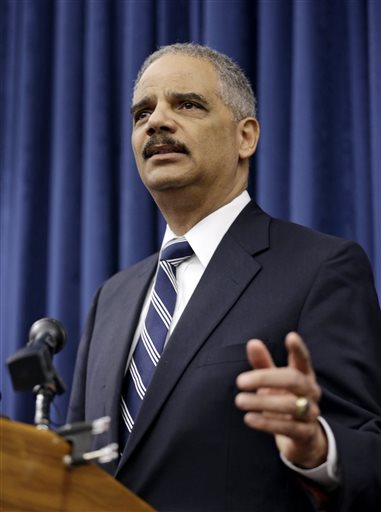
By MARK GILLISPIE
Justice Department report released Thursday spared no one in the Cleveland police chain of command amid findings of excessive use of force and civil rights violations.It was the second time in recent years the Justice Department has taken the Cleveland police to task over the use of force. But unlike in 2004, when the agency left it up to local police to clean up their act, federal authorities will intervene this time by way of a consent decree.
“These are problems long in the making,” said U.S. Attorney General Eric Holder during a news conference Thursday in Cleveland.
Holder said the DOJ’s 18-month investigation was prompted by more than the November 2012 event in which 13 police officers fired 137 shots into a car after a high-speed chase, killing two unarmed suspects. Ohio Attorney General Mike Dewine has called the killings of Timothy Russell and Malissa Williams a “systemic failure” on the part of the police.
Mayor Frank Jackson said Thursday that he continues to disagree with DeWine’s characterization of the police response, but noted that he was among those who asked the Justice Department to conduct its investigation.
Police Chief Calvin Williams said that while it’s not easy to have to share the DOJ’s findings with his 1,500-member department, he is committed to change.
“The people of this city need to know we will work to make the police department better,” Williams said.
The DOJ’s findings require the city to work with community leaders and other officials to devise a plan, which a judge will have to approve and an independent monitor will oversee. Eight other police departments in the country now operate under federal consent decrees.
The worst examples of excessive force in the DOJ report on Cleveland involve patrol officers who unnecessarily endanger lives by shooting at suspects and cars, hit people over the head with guns and punch and use Tasers on handcuffed suspects.
But supervisors and police brass received some of the report’s most searing criticism. The DOJ said officers were poorly trained and some don’t know how to implement use-of-force policies. The report also said officers are ill-equipped.
The agency said supervisors encourage some of the egregious behavior and often do little to investigate it. Some told the DOJ that they often write their reports to make an officer look as good as possible, the federal agency said. The DOJ found that only six officers had been suspended for improper use-of-force over a three-year period.
The mayor and his administration are ultimately responsible for providing police with what they need to do their jobs.
The Columbus police department, which operated under a consent decree in the early 2000s, has long given officers state-of-the-art technology to make their jobs easier and safer.
But in Cleveland, the report said, mobile computers that are supposed to be in patrol cars often don’t work and, even when they do, officers don’t have access to essential department databases.
___
AP writers Jennifer Smola in Cleveland and John Seewer in Toledo contributed to this story.



